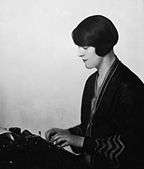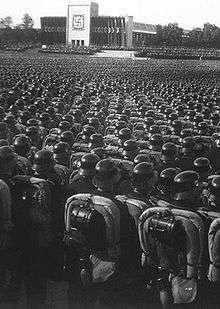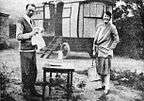
To have felt too much is to end in feeling nothing.
Dorothy Thompson (July 9, 1893 – January 30, 1961) was an American journalist.
Quotes

He is the very prototype of the Little Man.

The greatest menace in the world is not poison gas. There are gas masks against that. The menace is poisoned words, poisoned ideas.

What was once Sinclair Lewis is buried in no ground. Even in life he was fully alive only in his writing.
- He is formless, almost faceless, a man whose countenance is a caricature, a man whose framework seems cartilaginous, without bones. He is inconsequent and voluble, ill poised and insecure. He is the very prototype of the Little Man. … His movements are awkward. There is in his face no trace of any inner conflict or self-discipline.
And yet, he is not without a certain charm. But it is the soft almost feminine charm of the Austrian! When he talks it is with a broad Austrian dialect. The eyes alone are notable. Dark gray and hyperthyroidic, they have the peculiar shine which often distinguishes geniuses, alcoholics, and hysterics.- About Adolf Hitler, in "I Saw Hitler!" in Cosmopolitan (1931), later in I Saw Hitler! (1932)
- As far as I can see, I really was put out of Germany for the crime of blasphemy. … My offense was to think that Hitler is just an ordinary man, after all. This is a crime against the reigning cult in Germany, which says that Mr. Hitler is a Messiah sent by God to save the German people — an old Jewish idea. To question this mystic mission is so heinous that, if you are German you can be sent to jail. I, fortunately, am an American, so I merely was sent to Paris. Worse things can happen to one.
- Statement of August 1934, after being expelled from Germany, quoted in Dorothy Thompson : A Legend In Her Time (1973) by Marion K. Sanders, p. 199
- No people ever recognize their dictator in advance. He never stands for election on the platform of dictatorship. He always represents himself as the instrument — the Incorporated National Will. … When our dictator turns up you can depend on it that he will be one of the boys, and he will stand for everything traditionally American. And nobody will ever say "Heil" to him, nor will they call him "Führer" or "Duce." But they will greet him with one great big, universal, democratic, sheeplike bleat of "O.K., Chief! Fix it like you wanna, Chief! Oh Kaaaay!"
- Statement of 1935, quoted in Watchdogs of Democracy? : The Waning Washington Press Corps and How it Has Failed the Public (2006) by Helen Thomas, p. 172, and Queers in History: The Comprehensive Encyclopedia of Historical Gays, Lesbians and Bisexuals, and Transgenders (2009), p. 450
- It is true that the techniques of war are constantly "improved" as the genius of an age of invention is put in the service of the war machine. But that is not what is most disturbing. What is revolutionary is that the minds of men, women and children are being deliberately trained, directed, distorted, by every conceivable instrument of education and propaganda, to make them tolerant of war, receptive of war, prepared for war, lovers of war. The greatest menace in the world is not poison gas. There are gas masks against that. The menace is poisoned words, poisoned ideas.
- "Dilemma of a Pacifist"(1937)
- I know now that there are things for which I am prepared to die. I am willing to die for political freedom; for the right to give my loyalty to ideals above a nation and above a class; for the right to teach my child what I think to be the truth; for the right to explore such knowledge as my brains can penetrate; for the right to love where my mind and heart admire, without reference to some dictator’s code to tell me what the national canons on the matter are; for the right to work with others of like mind; for a society that seems to me becoming to the dignity of the human race.
I shall pick no fight, nor seek to impose by force these standards on others. But let it be clear. If the fight comes unsolicited, I am not willing to die meekly, to surrender without effort. And that being so, am I still a pacifist?- "Dilemma of a Pacifist"(1937)
- To have felt too much is to end in feeling nothing.
- A comment regarding her divorce from Sinclair Lewis, quoted by Vincent Sheean in Dorothy and Red (1963)
- What was once Sinclair Lewis is buried in no ground. Even in life he was fully alive only in his writing. He lives in public libraries from Maine to California, in worn copies in the bookshelves of women from small towns who, in their girlhood, imagined themselves as Carol Kennicotts, and of medical men who, as youths, were inspired by Martin Arrowsmith.
- On her former husband Sinclair Lewis, "The Boy From Sauk Center" in The Atlantic (November 1960)
- It is not the fact of liberty but the way in which liberty is exercised that ultimately determines whether liberty itself survives.
- In Ladies Home Journal, May 1958
"The New Russia" 1928
Dorothy Thompson, "The New Russia", New York: NY, Henry Holt and Company, (1928)
- Private shops [in Soviet Russia]. . . are taxed higher than co-operatives, are granted less favorable concessions, and enjoy a grudging legality. Nevertheless, their owners often make a great deal of money. The only explanation for it is the shortage of goods and the hunger for them. When one asks for the explanation of such a phenomenon in an agricultural country one is told: The government is exporting grain, the milk or egg price is too low and the peasants are holding back.
- p. 23
- In these ten years urban Russia having destroyed, exiled, or reduced to the most abject misery all representatives of that previous civilization, is without most bourgeoisie amenities.
- p. 24
- The hotels are entirely run by the Moscow Soviet, which seems to have picked its employees rather for their political reliability than for their experience or cleverness at hotel management.
- p. 25
- Every play which is produced—and for that matter, every book that is published, every picture which is exhibited, every film which is turned—is subjected to the Board of Censors… Romantic love in even its purest phases is not thought to be a fitting subject for consideration of citizens of a communist state;. . . the sex play is unknown in modern Russia… There remains as the ubiquitous theme for plays: revolution, with all the patriotic and nationalistic connotations which have grown up around it; heroism, sacrifice for the nation and class; consciousness of solidarity with one’s fellow proletarians; common suffering; great adventures with new ideas; great prospects for future machine age which is to be a sort of Russian-communist Americanism.
- pp. 27-28
- Indeed, gaiety is singularly lacking everywhere in Russia. What is intense and joyful goes into pioneer work and not into amusement. Only in the company of young communists and artists can one find stimulation.
- p. 32
"I Saw Hitler" 1932
Dorothy Thompson, "I Saw Hitler", Farrar and Rinehart, (1932)
- Anti-semitism became equal to anti-Republicanism. And Hitler went to the peasants with a campaign of anti-capitalism.
- p. 28
"Let the Record Speak" 1939
Dorothy Thompson, "Let the Record Speak", Boston: MA, Houghton Mifflin Company (1939
- Unity, in Fascist terms, means uniformity; freedom of conscience means insubordination; co-ordination means coercion.
- p. 20 (newspaper column: “Political Dictionary,” March 19, 1936)
- A Frenchman who is in close touch with the situation at home told me this week, ‘We would have Fascism in France already if Germany and Italy had not done it first.’
- p. 127 (newspaper column: “The French Crisis and Its Meaning for Us,” February 2, 1938)
- For Hitler first hatred was not Communism, but Austria-Hungry. . . And he loathed it for what? For its tolerance! He wanted eighty million Germans to rule with an iron hand an empire of eighty million ‘inferiors’—Czechs, Slovaks, Magyars, Jews, Serbs, Poles and Croats.
- p. 136 (newspaper column: “Write it Down,” February 18, 1938)
- For it is no longer possible to regard Fascism as the friend of Christianity. And in making a cultural treaty with Hitler, Franco has laid Spain wide open to the penetration of Nazi ideology, which has been repeatedly denounced by the Pope himself as anti-Christian.
- p. 287 (newspaper column: “Spain and the Catholics,” January 27, 1939)
- The Vatican newspaper in Rome, Osservatore Romano, said of National Socialism, ‘It is the most inhumane of all heresies. Hitler is true to his role of anti-Christ.’
- p. 287 (newspaper column: “Spain and the Catholics,” January 27, 1939)
- And now the beginning of the expropriation of church lands in Austria, have all revealed the true face of National Socialism, which more and more among pious Germans is called, under their breaths, ‘the brown Bolshevism.’
- p. 295 (newspaper column: “Pius XII—the former Diplomat,” March, 6, 1939)
- The contribution of Communism to the nihilism of democratic despair has been to shear humanism off democracy, to reduce the concept of democracy to crass materialism, to interpret life in terms of bread alone. The Nazis, as anti-humanistic as the Communists, have elevated the Communist Have-Not doctrine into a war cry for the Have-Not states.
- p. 353 (newspaper column: “As Litvinov Goes,” May 5, 1939)
- This kind of thinking is taking a long view, in which one must also count the imponderables, such as the effort of prolonged depression upon restless social forces; the inevitable necessity for National Socialism to move very far to the Left, the possible revolt of the people everywhere against dawdling tactics of their leaders.
- p. 355 (newspaper column, “As Litvinov Goes,” May 5, 1939)
- For already the myth is being carefully built up. Hitler is to be the Messiah of organic evolution—the anti-Christ of the will to power, which is not a will to national power but a will to power per se, the liberation of the lustfully destructive from any inhibitions whatsoever.
- p. 358 (newspaper column: “The Revolution of Nihilism,” May 8, 1939)
- The education of the Nazi elite, it turns out, is the education of super-racketeers and gangsters from among the biologically superior. The concept of ‘noblesse oblige’ is transformed into its polar opposite;…
- p. 359 (newspaper column: “The Revolution of Nihilism,” May 8, 1939)
External links
- American Cassandra: The Life Of Dorothy Thompson
- Profile at George Washington University
- Profile at Goddess Cafe
- Radio broadcast on Hitler's invasion of Poland (3 September 1939)
- Dorothy Thompson: A Legend In Her Time by Marion K. Sanders
- American Cassandra: The Life Of Dorothy Thompson by Peter Kurth
- Dorothy Thompson Papers at Syracuse University
This article is issued from
Wikiquote.
The text is licensed under Creative
Commons - Attribution - Sharealike.
Additional terms may apply for the media files.